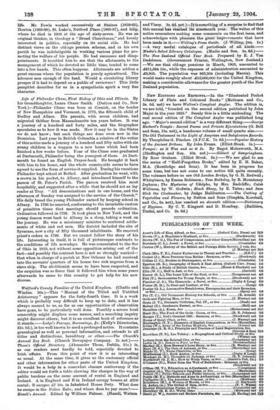Life of Philander Chase, First Bishop of Ohio and Illinois.
By his Granddaughter, Laura Chase Smith. (Dutton and Co., New York.)—Philander Chase was born at Cornish, on the border of New Hampshire and Vermont, in 1775, the fifteenth child of Dudley and Allace. His parents, with seven children, had migrated thither from Massachusetts ten years before. It was a journey of a hundred and forty miles, and the biographer speculates as to how it was made. How it may be in the States we do not know ; but such things are done even now in the Dominion. Last year in British Columbia a relative of the writer of this notice made a journey of a hundred and fifty miles with six young children in a waggon to a new home which had been finished a few weeks before. Four of the Chase sons graduated at Dartmouth, Philander being the youngest of them. At Dart- mouth he found an English Prayer-book. He brought it back with him to his home, and the whole countryside seems to have agreed to use the form of service it supplied. During his vacations Philander kept school at Bethel. After graduation he went, with a crown in his pocket, to Albany, and introduced himself to the parson of St. Peter's Parish. The parson received him most hospitably, and suggested after a while that he should act as lay reader at Troy. "All denominations met in one house, and the afternoon of Sunday was assigned to the service of the Church." His daily bread the young Philander earned by keeping school in Albany. In 1796 he married, conforming to the invariable custom of primitive times that marriage should precede ordination. Ordination followed in 1798. It took plae-e in New York, and the young deacon went back to Albany in a sloop, taking a week on the journey. He was a missionary minister to scattered settle- ments of white and red men. His district included the site of Syracuse, now a city of fifty thousand inhabitants. He received priest's orders in 1799. But we cannot follow the story of his life. Interesting in itself, it is full of picturesque contrasts to the conditions of life nowadays. He was consecrated to the See of Ohio in 1819, not without some opposition arising out of the fact—and possibly the contrast here is not so strongly marked— that when in charge of a parish at New Orleans he had received into the servants' quarters of his house two sick negroes from a slave ship. The abolitionist seems to have been suspected, and the suspicion was so fierce that it followed him when some years afterwards he came to this country to get help for his new diocese.










































 Previous page
Previous page